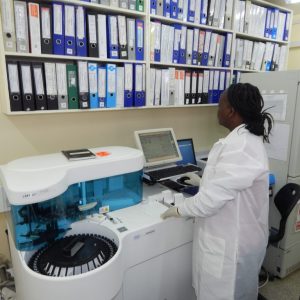CENTRE FOR INFECTIOUS AND PARASITIC DISEASES CONTROL RESEARCH (CIPDCR) BUSIA

Overview
General information
The Centre for Infectious and Parasitic Diseases Control Research (CIPDCR) is one of the 12 centers of the Kenya Medical Research Institute (KEMRI). It was established in 1947 as the Alupe leprosarium hospital when the government of Kenya set up a hospital for this purpose in Alupe. The mandates of the Alupe leprosarium included:
Management of leprosy as a referral centre for this disease in East Africa
Research on leprosy and other skin diseases
The first director East Africa Leprosy Research Centre was Dr. James Ross Ines. He served between January 1954 and January 1957. He previously acted as the inter-territorial leprologist between June 1947 and December 1953. The second Director of the East Africa Leprosy Research Centre was Dr. John Michael Baring Garred he served between January 1957 and January 1963. The third director was Dr. Charles McConachy Ross who served between January 1963 and 24th June 1964. The fourth director was Dr. Yona Otsyula who served between 1964 and 1977. The fifth director, Dr. Malachi Dundu Owili who served between 1977 and 1983, replaced him. The sixth director was Dr. Patrick Orege who served between 1983 and 1998. He was succeeded by Dr. Nicholas Ikol Adungo who served between September 1998 and September 2008. The eighth and current director is Dr. Matilu Mwau.
In 1979, the East Africa Leprosy Research Centre was taken over by KEMRI following the breakup of the East African Community. Its name was changed to the Alupe Leprosy and Skin Disease Research Centre its mandate was appropriately expanded to foster research that field.
In 2000, the centre’s name changed to Centre for Infectious and Parasitic Diseases Control Research (CIPDCR). Its mandate was expanded to include:
- HIV/AIDS, STD’S research
- Tuberculosis research
- Leprosy research
- Emerging and Remerging Diseases research
- Malaria research
- Geo-helminthes research
- Fungal infections research
Mission
Our mission is to improve human health and quality of life through research, capacity building, innovation and service delivery
vision
Our vision is to be a leading centre of excellence in research for human health.
Products and services offered
The Centre offers clinical, pharmacy and laboratory services in both research and routine activities. These include;
1. Outpatient clinic
2. Biochemistry/serology
3. Bacteriology/mycology
4. Parasitology/hematology
5. Molecular/immunology
Functions
- Research: To conduct research in infectious diseases, parasitic diseases, and Non-Communicable diseases; These includes research on
(i) Leprosy and Skin Disease
(ii) HIV/AIDS, STDs Research
(iii) Tuberculosis Research
(iv) Emerging and Remerging Diseases Research
(v) Malaria Research
(vi) Geo-Helminths Research; and
(vii) Fungal Infectious Research.
- Clinical services: The center offers both normal and specialized clinical services such as skin diseases treatment. It is also engaged in Patient management, pharmacy services, laboratory services, counselling and testing services.
- Establishing partnerships and collaborations to support Centre’s operations;
- Linking development partners with identified strategic projects/programs;
- Coordinating the Implementation of funding programs and maintaining their impact
In carrying out its functions the Centre is organized into the following Divisions: –
- BIOMEDICAL RESEARCH DIVISION
- CLINICAL SERVICES DIVISION
- SUPPORT SERVICES DIVISION
Ongoing Projects
HIV Point of Care Technologies Evaluations
Establishment of HIV drug resistance as a standard of care in Kenya
Prevalence of acquired HIV drug resistance among adult patients on HAART in Kakamega County, Western Kenya
Consolidation and enhancement of a comprehensive HIV molecular diagnostics program for Kenya
The sero-prevalence and risk factors for dengue infection in selected facilities in the Kenyan coast
Evaluating a mobile phone disease surveillance system in Kenya
Identification of genital Chlamydia strains from women accessing Genito Urinary Medicine services at Special Treatment Clinic
Testing HIV Dried Blood Spot clinical specimens from Infants using the Aptima HIV-1 Quant Dx Assay
Testing HIV Dried Blood Spot clinical samples from Adult patients using the Aptima HIV-1 Quant Dx Assay
Evaluation of HIV Point-of-care testing assays for the monitoring of HIV + patients
Geographic distribution of tsetse flies and epidemiologic significance to human and bovine trypanosomiasis in Busia County.
Detection of hepatitis B virus (HBV) infection among HIV-exposed infants in western Kenya using dried-blood spots. A preliminary study
Superficial fungal infections in the context of human immunodeficiency virus (HIV) in western Kenya
Pattern of injury and risk factors associated with commercial motorcycle accidents among riders and pillion passengers in Busia County, Kenya
Prevalence and molecular characterization of HIV-1 drug resistance patterns among patients visiting selected rural health facilities in Busia county, Kenya
Prevalence, Risk Factors and Molecular Epidemiology of Trachoma in East Pokot, Baringo County
Completed Projects
COMING SOON

PROF. MATILU MWAU
Matilu Mwau is an infectious diseases researcher at the Kenya Medical Research Institute and a Visiting Professor, Nagasaki University. He is currently the Deputy Director at the Institute’s Center for Infectious and Parasitic Diseases Control Research (CIPDCR). He was the Executive Director, Consortium for National Health Research (CNHR), from 2014-2016. Between 2013 and 2014, he was Associate Professor in Medical Microbiology, Jomo Kenyatta University of Agriculture and Technology. He holds a degree in Medicine and Surgery from the University of Nairobi, a Master’s degree in Tropical Medicine from Nagasaki University and a Doctorate Degree in Clinical Medicine (Immunology) from Oxford University. His infectious diseases research revolves around HIV, hepatitis and arthropod borne viruses, and he has published extensively in these areas.
RECENT PUBLICATIONS
1. Nicodemus Nzoka Maingi, Ismail Ateya Lukandu, and Matilu Mwau. Comparative Analysis of the C4.5 and ID3 Decision Tree Algorithms for Disease Symptom Classification and Diagnosis,‖ International Research Journal of Advanced Engineering and Science, Volume 4, Issue 2, pp. 188-194, 2019
2. Elizabeth N. Ng’ang’a, Humphrey K. Wanjiku, Eddy Okoth Odari, Allan Ole Kwallah, Matilu Mwau. Seroprevalence of Chikungunya Virus in Febrile Patients in the Kenyan Coast. IOSR Journal of Pharmacy and Biological Sciences (IOSR-JPBS) e-ISSN:2278-3008, p- ISSN:2319-7676. Volume 14, Issue 3 Ser. II (May – June 2019), PP 40-44 www.iosrjournals.org
3. Priska Bwana, Joshua Ageng’o, Matilu Mwau. Performance and usability of Cepheid GeneXpert HIV-1 qualitative and quantitative assay in Kenya. PLoS One. 2019; 14(3): e0213865. Published online 2019 Mar 22. doi: 10.1371/journal.pone.0213865. PMCID: PMC6430374
4. Bwana P, Ochieng’ L, Mwau M. Performance and usability evaluation of the INSTI HIV self-test in Kenya for qualitative detection of antibodies to HIV. PLoS One. 2018 Sep 13;13(9):e0202491.
